11 Side Effects Of Almond Milk: What You Need To Know
Learn everything about the not-so-good effects of almond milk on your health.
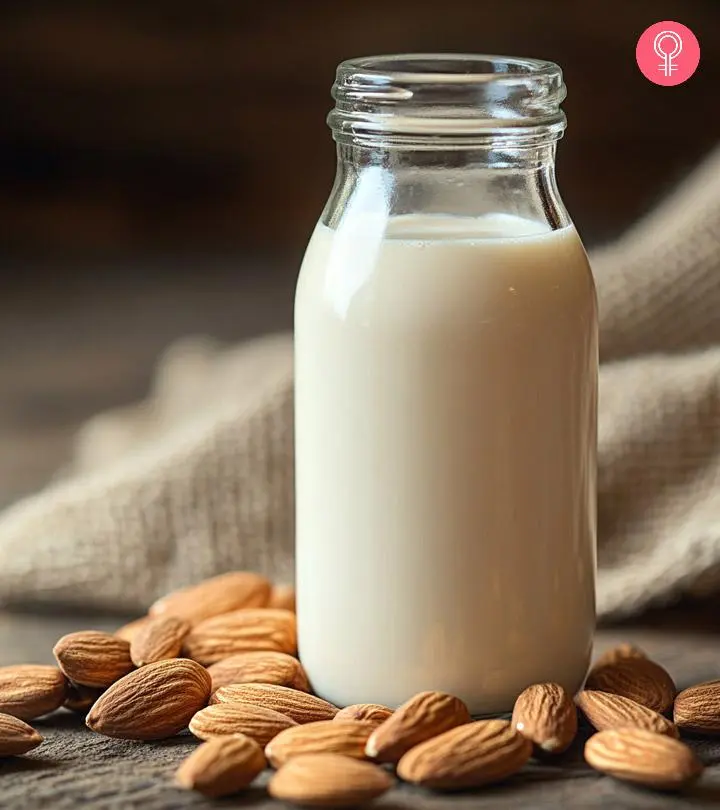
Image: Midjourney/ StyleCraze Design Team
Almond milk makes for a nutritious and vegan alternative to regular animal milk. While it offers various health benefits when consumed regularly, there are also certain side effects of almond milk you need to be aware of! Rich in proteins, vitamins, calcium, and important minerals, almond milk can help improve your overall immunity and health (1). However, there are certain things you should keep in mind before consuming almond milk. In this article, we learn if this vegan nut milk is good for everyone, and how you can avoid any possible risks and side effects of almond milk!
 Know The Flip Side: Almond Milk
Know The Flip Side: Almond MilkShort-Term Effects
Nut allergies and skin reactions due to them, abdominal issues, cold-like symptoms, and high sugar levels.
Long-Term Effects
Thyroid gland enlargement, nutritional deficiency in children, digestive problems, and respiratory issues.
Drug Interactions
None.
When To See A Doctor
In case of digestive issues such as diarrhea, wheezing and troubled breathing, severe deficiency, swollen thyroid gland, and skin irritation.
In This Article
Side Effects Of Almond Milk
Understanding almond milk side effects will let you know why you shouldn’t drink it alone as a substitute for regular milk.
1. Nut Allergies

Almonds are a part of the list of the most popular allergic nuts. This is because almonds contain eight types of allergy-causing proteins, like prolamins and cupin, that can trigger allergic reactions in sensitive individuals. Hence, the consumption of almond milk by anyone with nut allergies can lead to swelling in the facial region, anaphylaxis, nausea or diarrhea (2).
 Did You Know?
Did You Know?2. Effects On Thyroid Gland
Almond is a goitrogenic food, which means that it contains substances that can affect the thyroid gland. It may affect the thyroid gland’s ability to use iodine effectively. Iodine is essential for the production of thyroid hormones, and when the gland can not get enough iodine, it may grow larger, leading to a condition called goiter (4).
A counter view is that consuming almond milk can boost one’s immunity power. This may be because almonds are rich in antioxidants like flavonoids and vitamins C and E that help support healthy immune function (1). However, in the light of this side effect, one might be forced to think otherwise as it can easily lead to thyroid dysfunction.
3. High Sugar Levels

Packaged almond milk often contains added sugar, particularly its flavored or sweetened varieties (5). While it can be a tasty and convenient alternative to dairy milk, consuming almond milk with added sugar regularly may contribute to several health concerns. For instance, excess sugar adds extra calories to your diet that, if not burned off, may lead to weight gain over time. This, in turn, is associated with an increased risk of conditions like heart disease. Further, added sugars may also cause rapid increases in blood sugar levels that can be problematic for individuals with diabetes or insulin resistance (6).
4. Childhood Issues
Many people think that almond milk can ensure the healthy development of a baby and thus feed it to them. However, it has been found that the consumption of almond milk might not display any impact on their health in the beginning but could lead to complications in the later run (7). This could be because almond milk is low in protein and minerals, like potassium and zinc, that are vital for a child’s growth (5).
5. Milk Allergies

Almond milk is often marketed as a safe alternative for those with lactose intolerance (allergy to dairy milk). However, it is important to note that people who are allergic to lactose can also have side effects of almond milk if consumed in excess. Also, commercial almond milk may contain additives like thickeners, emulsifiers, or stabilizers that could lead to digestive discomfort, such as bloating or an upset stomach. Some varieties may also contain food coloring agents that could cause allergic reactions (8). In this case, it is best to avoid store-bought almond milk. You could, instead, try to prepare it at home.
6. Skin Reactions
Consuming almond milk can lead to skin rash and reactions like itching, eczema and hives (9). These reactions mostly appear within 10 minutes to 1 hour of having consumed the flavored milk. It is important to note that these reactions are usually a sign of almond allergy. So, if you experience any of them, visit your doctor immediately.
7. Abdominal Issues

People who are allergic to almond milk or any additive in them might have to face abdominal cramps as it could become difficult for them to digest this milk (10).
A case study published in the Clinical Medical Reviews And Case Reports journal discusses a similar issue. The study involved a 62-year-old woman who experienced abdominal pain and an unintentional weight loss of 12 pounds after consuming almond milk. Her medical tests showed no issues. When she stopped drinking almond milk, her symptoms disappeared. The case study suggests that this may be due to the additives like thickeners present in almond milk (10).
8. Breathing And Respiration Issues
The side effects of almond and its milk include breathing and respiration issues, such as wheezing and breathing difficulties. This is generally a sign of allergy and may be frequently seen in the cases of people who are asthmatic or have any other issues with their breathing (11).
A study published in the Indian Journal of Allergy, Asthma, And Immunology looked at 65 people, comprising 50 with bronchial asthma and 15 healthy individuals, to see how food intolerance was linked to asthma. A total of 221 food items were tested for intolerance. Among nuts, almonds were the most common food that caused respiratory issues for asthma patients. Also, the prevalence of intolerance was higher in males when it came to the asthma group (11).
9. Digestive Troubles
The people who are unable to digest almond flavored milk could have allergic symptoms like diarrhea or vomiting. This usually occurs due to the additives present in almond milk (10). Jesse Feder, Clinical Dietitian at the Memorial Regional Hospital South, says, “Almond milk will most likely not cause bloating or gas when consumed.”
He adds, “However some people may be intolerant to the typical preservatives or thickeners in almond milk. Specifically, the thickener carrageenani A naturally-occurring thickening agent found in red seaweed that is used by manufacturers but may harm the digestive system. has been known to cause intestinal bloating and gas when consumed.”
 Quick Tip
Quick Tip10. Cold-Like Symptoms

Almond milk allergies could also lead one to face symptoms like runny nose, wheezing combined with breathing troubles. A study conducted in Southern Taiwan found that almond allergies were linked to allergic rhinitis in people aged 2 to 93 (9). Allergic rhinitis is a condition where the nose gets irritated and inflamed, often causing symptoms like sneezing, a runny nose, or congestion (12). These may be more prominent in people who have nut allergies, but could also be due to any other allergies as well. So, if one has any such allergy already, almond milk should be consumed carefully.
11. May Increase Risk Of Kidney Stones
Almond milk is a popular dairy-free alternative, but its impact on the kidneys is worth noting. Almonds contain oxalates, which are naturally occurring compounds that can contribute to kidney stone formation when consumed in excess (13).
Almond milk may contain some oxalates, although in lower concentrations compared to almond nuts themselves. However, compared to other plant-based milk alternatives, it has the highest oxalate concentration (14). Thus, if you have a history of kidney stones or concerns about your kidney health, it is recommended to consult a healthcare professional who can provide personalized dietary recommendations to prevent any potential risks while enjoying the benefits of almond milk.
So, by now it is clear who should avoid almond milk. But to be on the safe side, here’s a list you can keep handy!
Who Should Avoid Almond Milk?
Based on the above-mentioned side effects of almond milk, here is a list of people who should avoid almond milk:
- People with nut allergies
- People with thyroid issues
- People with diabetes or insulin resistance
- Children
- People allergic to additives in commercial milk
- People with asthma
- People with kidney stone concerns
If you do not have any of these issues, you may consume almond milk in moderation. However, if you are having it for the first time, it is best to start with a small quantity to see how your body reacts. If there are no adverse effects, you can increase the quantity. However, if you experience any of these allergic reaction symptoms, itching, swelling, difficulty breathing, or digestive discomfort after consuming almond milk, consult a healthcare professional right away.
It is best to avoid almond milk in the case mentioned above. Wondering what you can have instead? Scroll down to the next section.
Almond Milk Alternatives
If you are allergic to almond milk, it is best to avoid other nut milks, such as cashew milk. Try the following plant-based alternatives instead:
- Oat Milk: It is a creamy, slightly sweet milk made from oats. It contains fiber, calcium, potassium, and vitamins A, D, and B12 (15). It is great for coffee, baking, or cereal.
- Soy Milk: It is made from soybeans and has a creamy, slightly bean-like flavor. It is high in protein and also contains calcium, and vitamins B12 and D (16). It works well in savory dishes, smoothies, and baking.
- Coconut Milk: it is made from the meat of coconuts and has a rich, creamy flavor. It is rich in fat and calcium and is best for curries, soups, and desserts (17).
When choosing between these three alternatives, consider the flavor and texture that will best suit your taste or dish. For instance, if you need an all-purpose alternative with a mild, slightly sweet taste, try oat milk. Similarly, soy milk is best for those looking for protein-rich alternatives. Ultimately, the best choice will depend on your dietary needs and personal taste preferences.
A delicious drink like almond milk, on the face of it, appears safe and healthy. However, the above listed points tell a different story! So, it is important that one consumes almond milk with caution and sparingly, not making it a part of our daily diet without consulting your doctor. Following this can permit one to enjoy it and even keep almond milk effects at bay.
Key Takeaways
- Almond milk can cause respiratory and thyroid problems.
- Those who have nut allergies or other food allergies should be careful while consuming almond milk.
- Excess sugar consumption through almond milk can lead to health problems.
- In order to avoid digestion issues from almond milk, it should be consumed carefully and sparingly.
Infographic: Major Side Effects Of Almond Milk
Almond milk is the most popular plant milk with several healthy nutrients. It is also the best vegan alternative to regular milk. But it can cause some adverse reactions due to excessive consumption. You must remember its negative effects before you inject too much of it.
Check out the infographic below to learn about the major side effects of almond milk. Illustration: StyleCraze Design Team
Almond milk is a great vegan, lactose-free, and nutritious alternative to whole cow milk. Despite several benefits of almond milk, overconsumption can have its own set of disadvantages. The side effects of almond milk range from respiratory problems to an increased risk of thyroid problems. Furthermore, it may cause digestive troubles, cold-like symptoms, or skin reactions. Due to its affiliation with tree nuts, almond milk may cause allergic reactions in individuals who are sensitive to nuts. Such individuals should show caution and avoid drinking this beverage. So is almond milk bad for you completely? The answer is – no! Limiting or avoiding its consumption can prevent these possible unwanted effects.
Frequently Asked Questions
Can almond milk flare up IBS?
Almond milk will most likely not flare up any IBS symptoms. However, if the almond milk you have is sweetened and has thickeners/preservatives, you are more likely to experience an IBS flare-up.
Jesse Feder suggests having almond milk with limited ingredients, preferably almonds, filtered water, and added vitamins. He adds, “I treat clients with IBS, and they have had flare-ups from certain almond milk with these added thickeners/preservatives. After they switched to almond milk without them, they have told me they have yet to experience any IBS flare-ups from their almond milk.”
Does almond milk make your breasts bigger?
Almond milk doesn’t make your breasts bigger. While it contains estrogeni A hormone released in a woman's body that regulates her menstrual cycle and contributes to the growth of pubic, armpit, and breast hair. which helps rebalance hormones as women approach menopause, due to which they experience hormonal imbalance, it has little impact on the body compared to the naturally produced estrogeni A hormone released in a woman's body that regulates her menstrual cycle and contributes to the growth of pubic, armpit, and breast hair. hormone (18).
Does almond milk reduce testosterone?
The intake of almonds may boost sex hormone-binding globulin (SHBG), which binds to testosterone and reduces testosterone levels in the body (19), (20).
How does almond milk compare to dairy milk?
Almond milk is plant-based and is naturally lactose-free, while dairy milk is derived from animal sources and contains lactose. This makes the latter unfit for those who are lactose intolerant. As for their nutrient profile, 100g of unsweetened almond milk contains 19 kcal energy, 0.66g protein, and 1.56g fats (21). Whole dairy milk, on the other hand, contains 60 kcal energy, 3.28g protein, and 3.2g fats (22). So, almond milk is lower in calories and fat but has less protein content.
Illustration: Serious Side Effects Of Almond Milk
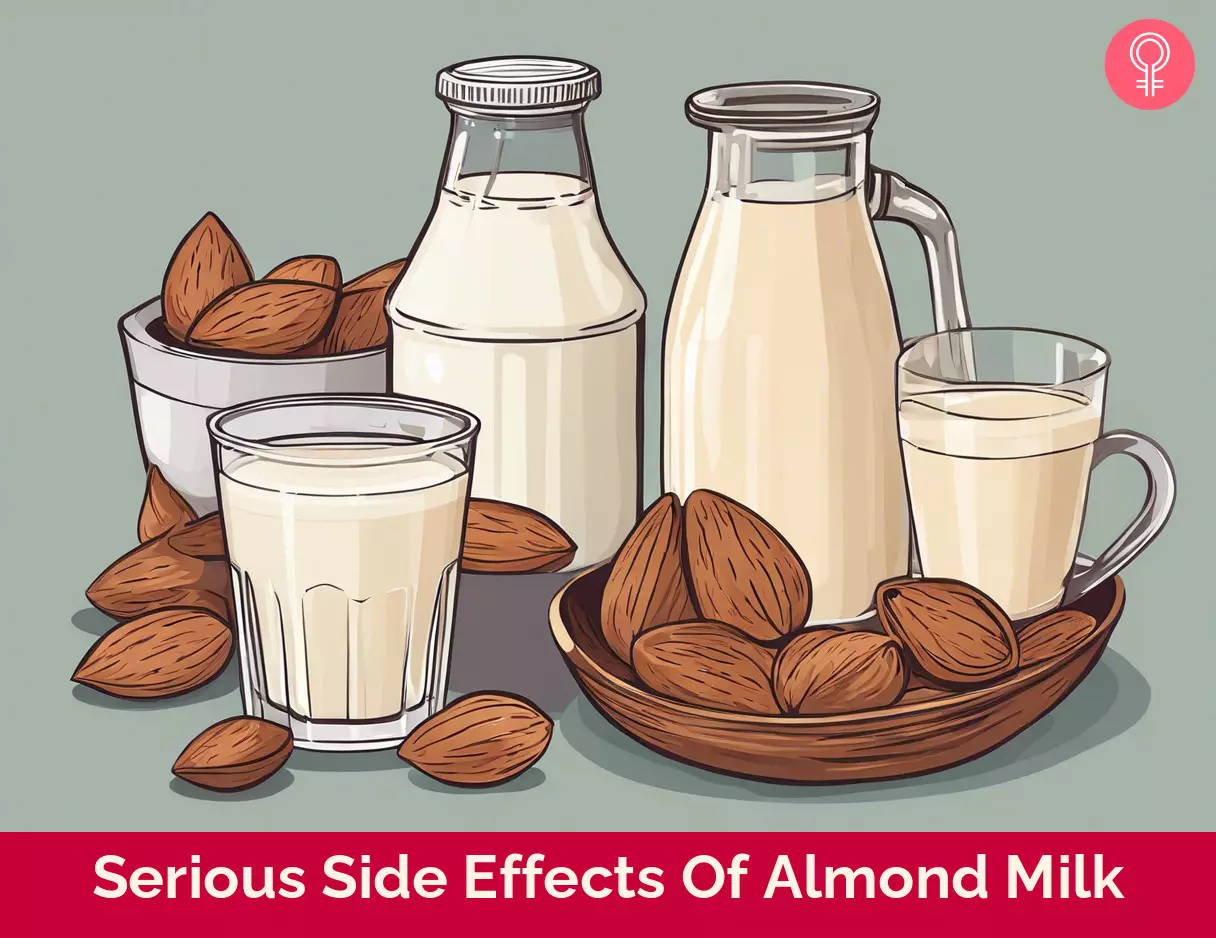
Image: Stable Diffusion/StyleCraze Design Team
Discover the 6 shocking side effects of almond milk you never knew about. Learn how this popular milk alternative can affect your health. Scroll down to learn more.
References
Articles on StyleCraze are backed by verified information from peer-reviewed and academic research papers, reputed organizations, research institutions, and medical associations to ensure accuracy and relevance. Read our editorial policy to learn more.
- Common foods for boosting human immunity: A review
https://pmc.ncbi.nlm.nih.gov/articles/PMC10630845/ - Almond Allergens: Molecular Characterization Detection and Clinical Relevance
https://pubs.acs.org/doi/abs/10.1021/jf2044923 - Almond Allergy: An Overview on Prevalence Thresholds Regulations and Allergen Detection
https://pmc.ncbi.nlm.nih.gov/articles/PMC6266711/ - Effects of the Environment Chemicals and Drugs on Thyroid Function
https://www.ncbi.nlm.nih.gov/books/NBK285560/ - Dairy and Plant-Based Milks: Implications for Nutrition and Planetary Health
https://pmc.ncbi.nlm.nih.gov/articles/PMC10504201/ - Sugar Sweetened Beverages Obesity Type 2 Diabetes and Cardiovascular Disease risk
https://pmc.ncbi.nlm.nih.gov/articles/PMC2862465/ - The nutritional limitations of plant-based beverages in infancy and childhood
https://pubmed.ncbi.nlm.nih.gov/29130721/ - The impact of selected food additives on the gastrointestinal tract in the example of nonspecific inflammatory bowel diseases
https://pmc.ncbi.nlm.nih.gov/articles/PMC9479712/ - An Updated Overview of Almond Allergens
https://pmc.ncbi.nlm.nih.gov/articles/PMC8399460/ - “Dairy-Free” Dietary Substitute Abdominal Pain and Weight Loss
https://www.researchgate.net/publication/291347385_Dairy-Free_Dietary_Substitute_Abdominal_Pain_and_Weight_Loss - Prevalence of food intolerance in bronchial asthma in India
https://www.researchgate.net/publication/320371909_Prevalence_of_food_intolerance_in_bronchial_asthma_in_India - Allergic Rhinitis
https://www.ncbi.nlm.nih.gov/books/NBK538186/ - Oxalate Content and Antioxidant Activity of Different Ethnic Foods
https://pubmed.ncbi.nlm.nih.gov/32709427/ - Plant-Based Milk Alternatives and Risk Factors for Kidney Stones and Chronic Kidney Disease
https://www.ncbi.nlm.nih.gov/pmc/articles/PMC8611107/ - Oat milk unsweetened plain refrigerated
https://fdc.nal.usda.gov/food-details/2257046/nutrients - Soy milk unsweetened plain shelf stable
https://fdc.nal.usda.gov/food-details/1999630/nutrients - Coconut milk
https://fdc.nal.usda.gov/food-details/2705413/nutrients - Estrogen
https://www.ncbi.nlm.nih.gov/books/NBK538260/ - Differential effects of walnuts vs almonds on improving metabolic and endocrine parameters in PCOS
https://pubmed.ncbi.nlm.nih.gov/21157477/ - Sex hormone binding globulin: origin function and clinical significance
https://pubmed.ncbi.nlm.nih.gov/2080856/ - Almond milk unsweetened plain refrigerated
https://fdc.nal.usda.gov/fdc-app.html#/food-details/2257045/nutrients - Milk whole
https://fdc.nal.usda.gov/fdc-app.html#/food-details/1097512/nutrients
Read full bio of Sarah Spann
- Jesse Feder, RDN/LDN, is a Clinical Dietitian at the Memorial Regional Hospital. He is also a certified by the American College of Sports Medicine as a personal trainer (ACSM-CPT) and the National Strength and Conditioning Association as a Certified Strength and Conditioning Specialist (NSCA-CSCS).
 Jesse Feder, RDN/LDN, is a Clinical Dietitian at the Memorial Regional Hospital. He is also a certified by the American College of Sports Medicine as a personal trainer (ACSM-CPT) and the National Strength and Conditioning Association as a Certified Strength and Conditioning Specialist (NSCA-CSCS).
Jesse Feder, RDN/LDN, is a Clinical Dietitian at the Memorial Regional Hospital. He is also a certified by the American College of Sports Medicine as a personal trainer (ACSM-CPT) and the National Strength and Conditioning Association as a Certified Strength and Conditioning Specialist (NSCA-CSCS).
Read full bio of Tanya Choudhary
Read full bio of Ravi Teja Tadimalla
Read full bio of Moksha Gandhi





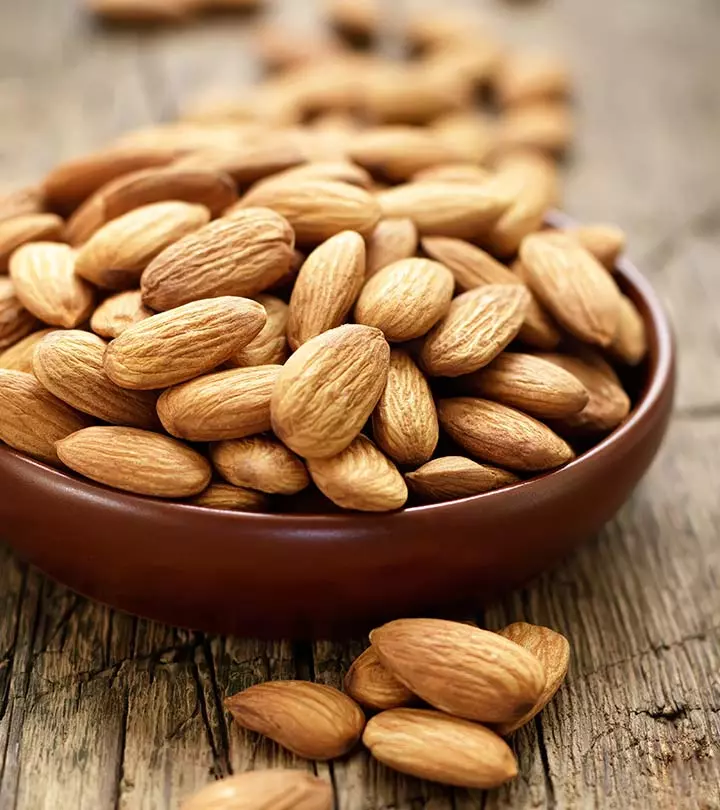



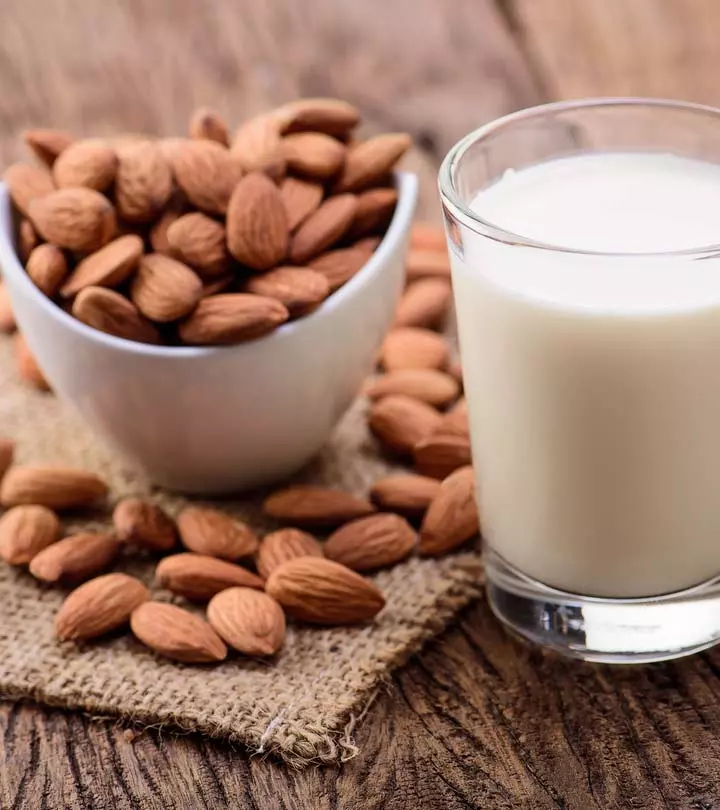
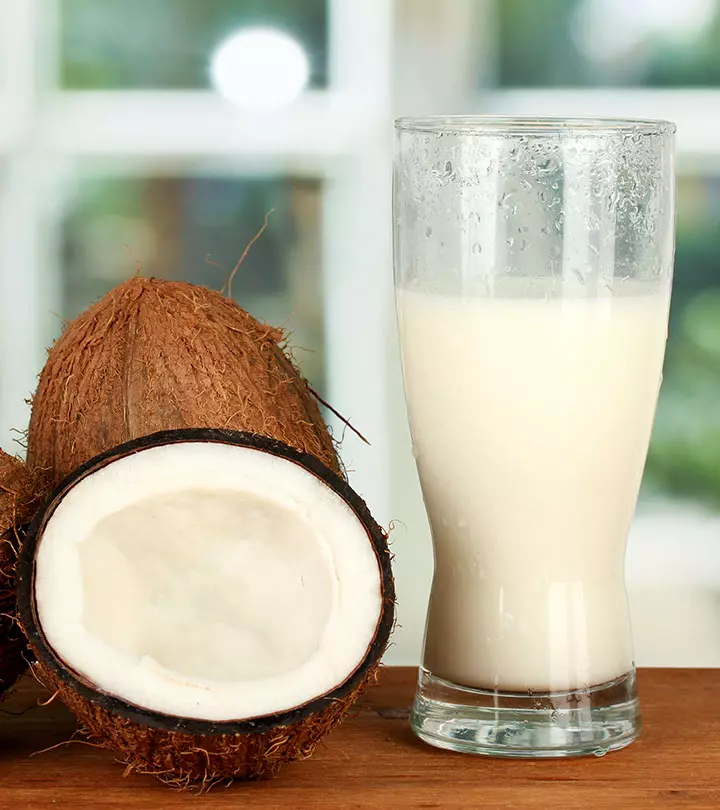
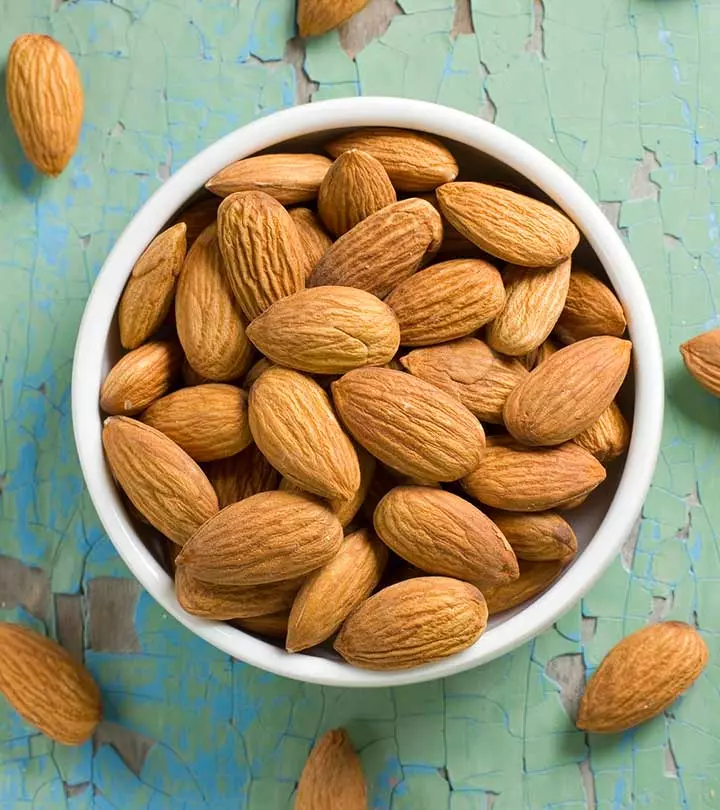














Community Experiences
Join the conversation and become a part of our empowering community! Share your stories, experiences, and insights to connect with other beauty, lifestyle, and health enthusiasts.